analysis Asia
What triggered violent protests across Indonesia, and how bad could it get for President Prabowo?
Despite President Prabowo Subianto’s appeal for calm, protests erupted across major cities including capital Jakarta on Friday, following a delivery rider’s death after being run over by a police vehicle in an earlier rally.
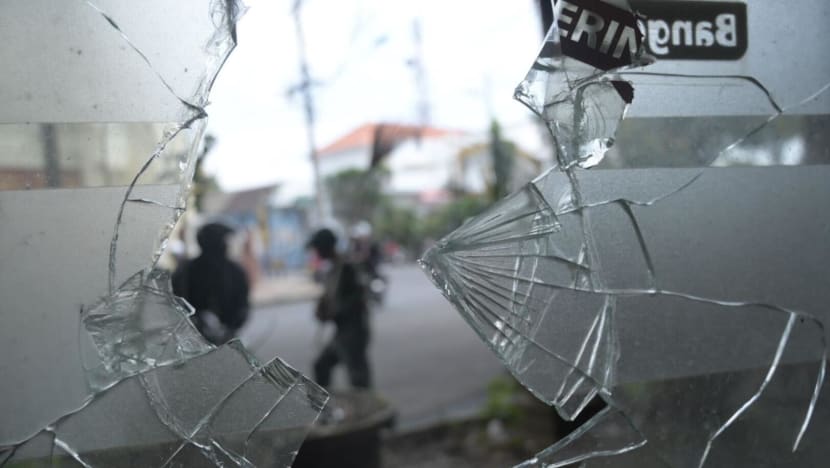
A smashed window of a police station in the city of Malang in East Java on Saturday (Aug 30, 2025). (Photo: CNA/Wisnu Prasetyo)

This audio is generated by an AI tool.
JAKARTA: The protests that turned violent in Jakarta and several other Indonesian cities on Friday (Aug 29) were the culmination of public frustration with lawmakers, who are seen as insensitive to the hardships ordinary people are facing, analysts said.
That frustration boiled over after police violence claimed the life of a motorcycle taxi driver during a protest on Thursday against lawmakers’ allowance hikes, prompting angry crowds to target police stations and the national parliament building.
Analysts warned the unrest could set off a domino effect that may ultimately threaten President Prabowo Subianto’s administration if the government fails to act decisively.
Prabowo’s call on Friday morning for an investigation into police violence was dismissed as mere formality as protestors took to the streets later that day, with analysts arguing the president must take concrete steps to end such abuses and show that his government is genuinely listening to public grievances.
“Prabowo seems to be in his own bubble. He appears detached from the reality on the ground, which makes his statement sound normative even as public anger has already reached a boiling point,” Kunto Adi Wibowo, a political analyst at Padjadjaran University, told CNA.
“His statement ultimately failed to achieve its purpose of calming the public.”
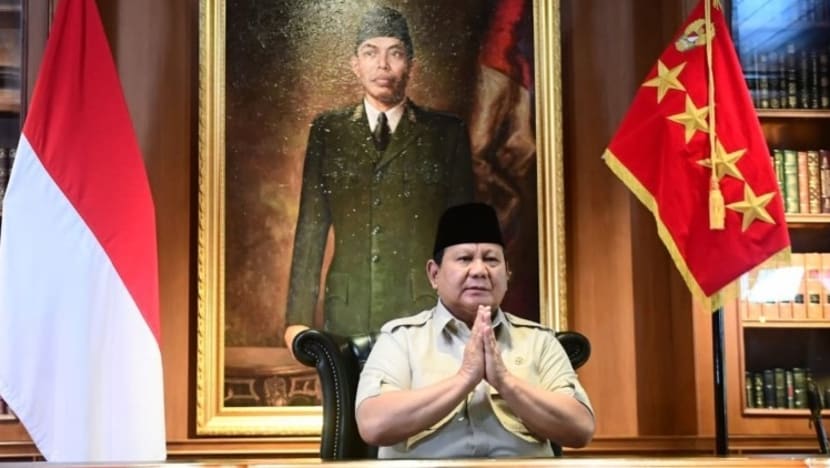
ANGER AT LAWMAKERS, THEN POLICE
On Saturday morning, Jakarta residents awoke to the wreckage of the previous day’s unrest. Burned-out car frames were strewn across the street in front of the Mobile Brigade headquarters in Kwitang, Central Jakarta.
Bus shelters and police posts across parts of Jakarta were left in ashes, their blackened remains standing as grim reminders of the clashes that raged from Friday into the early hours of Saturday.
Meanwhile, the walls of the Jakarta Police headquarters and the fences of the national parliament building were scrawled with anti-police graffiti.
On Saturday morning, brief clashes broke out outside the Mobile Brigade headquarters in Kelapa Dua, Depok, West Java, where police fired tear gas to disperse dozens of protesters on motorcycles.
A 21-year-old motorcycle ride-sharing driver, was hit at the site of violent clashes on Thursday in Jakarta as police sought to disperse demonstrators protesting about a number of issues, including lawmakers' pay and education funding.
Beyond Jakarta, demonstrations also erupted in several other Indonesian cities as expressions of anger over the death of Affan Kurniawan.
Affan, 21, was killed on Thursday night when he was struck and run over by a police armored vehicle deployed to disperse protesters. At the time, he had been delivering a food order and was not part of the protest.
In Makassar, South Sulawesi, three people were killed on Friday when hundreds of protesters set fire to the provincial parliament building.
Dozens of cars were also torched on the street outside.
Similar unrest, though without fatalities, also erupted in Surabaya, Bandung, Solo, and Yogyakarta.
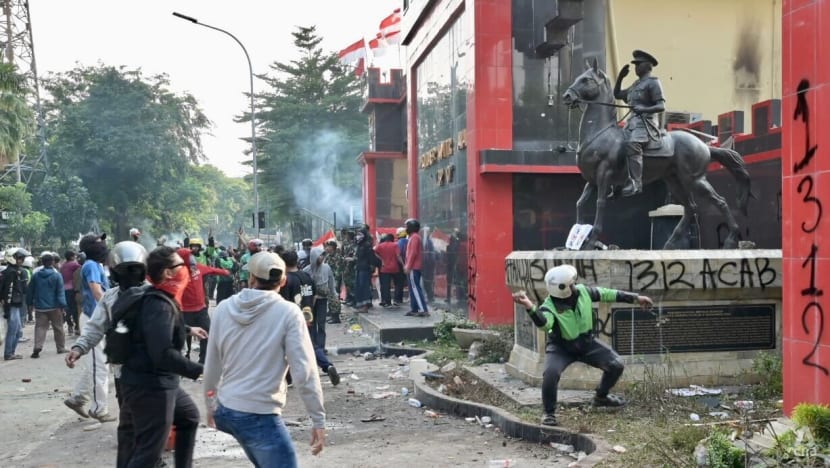
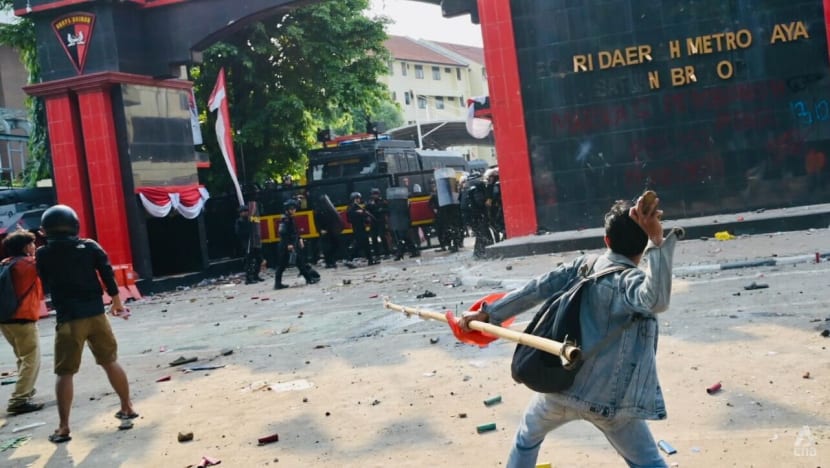
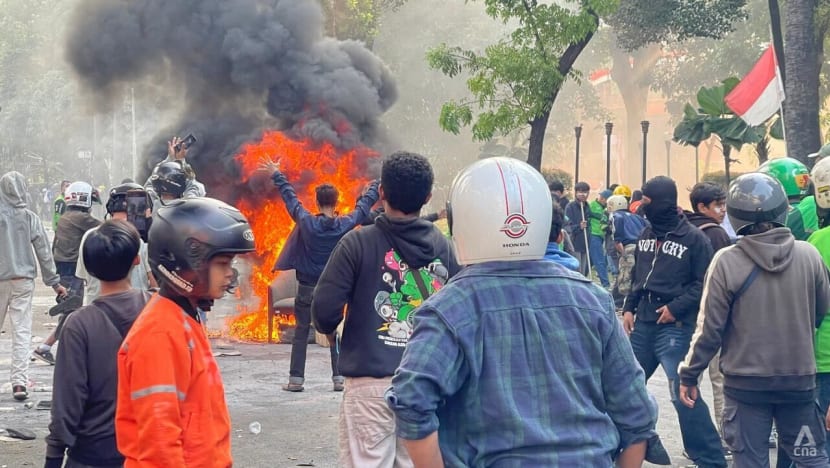
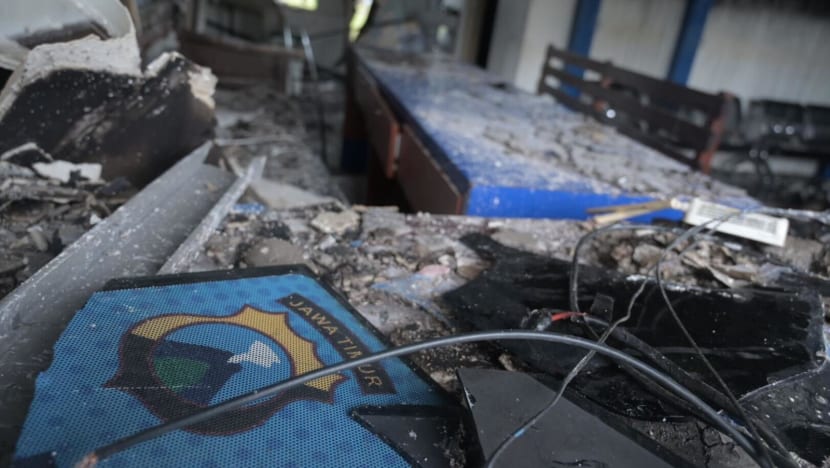
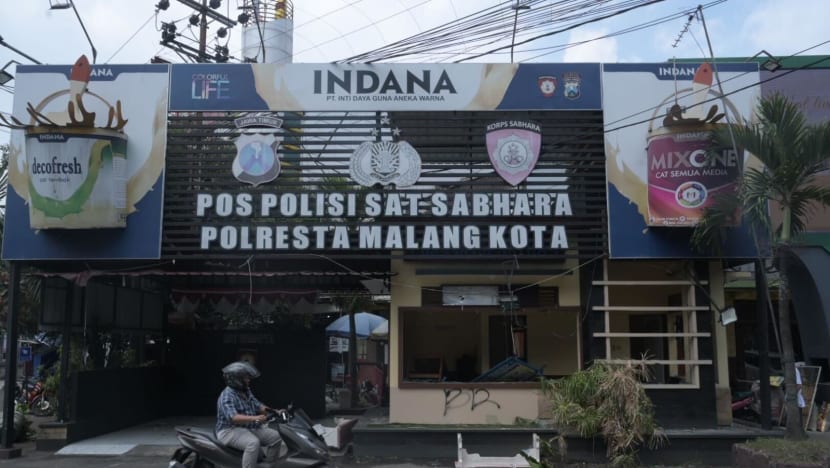
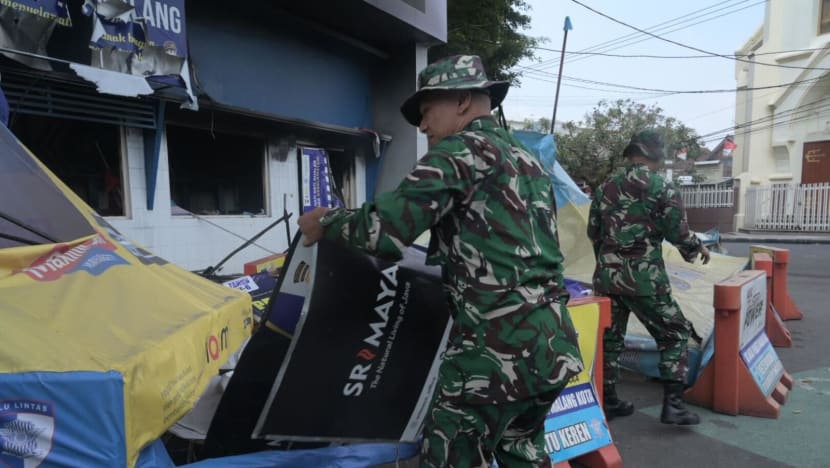
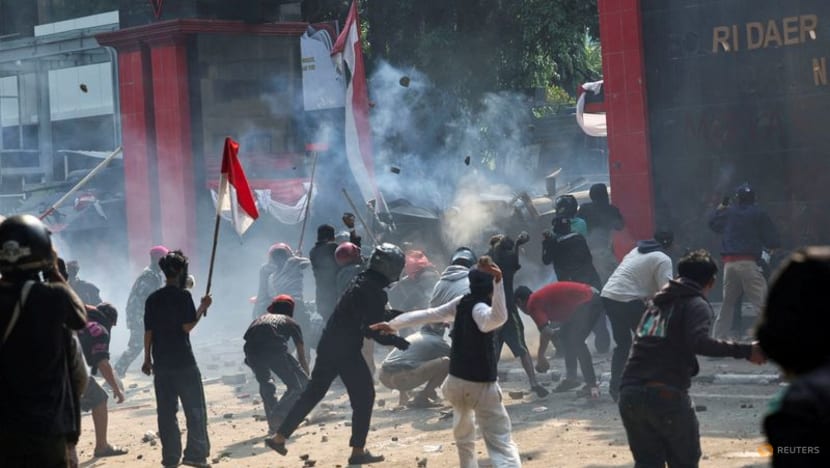
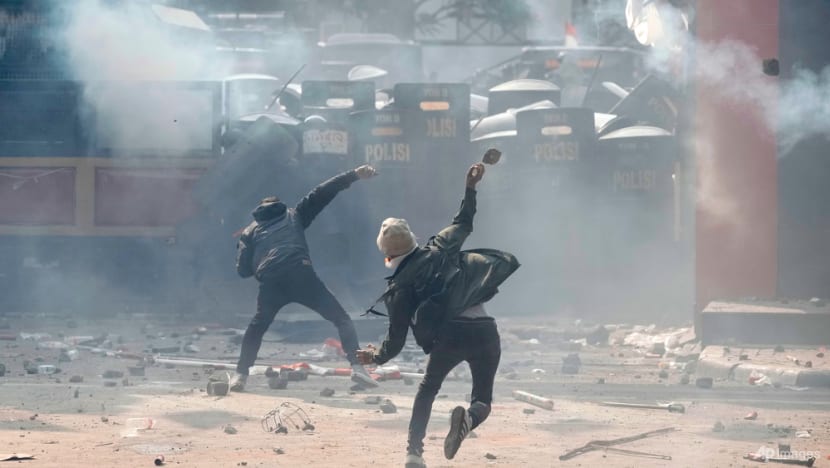
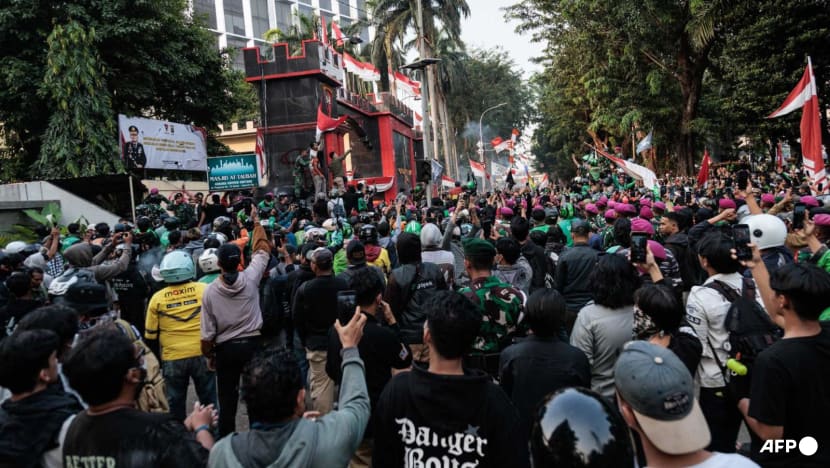
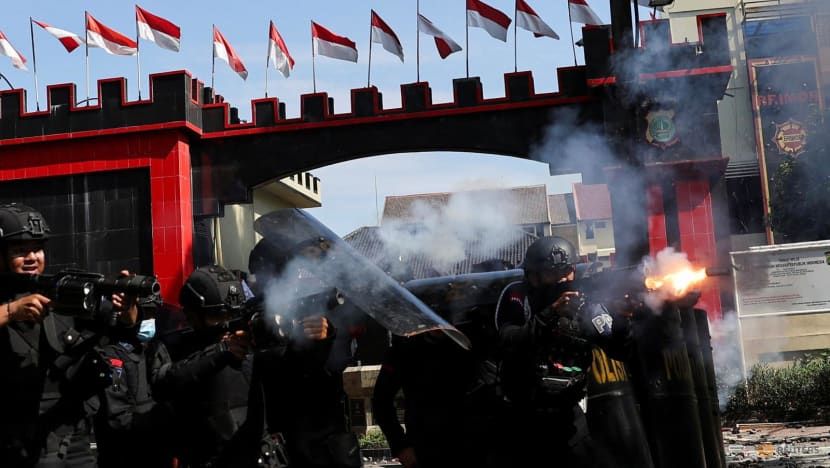
In Malang, a city in East Java, a CNA team came across the aftermath of protests at several local police posts - at least four were badly ransacked and burned.
At one post, windows were smashed and signs were destroyed - with soldiers seen on site on Saturday clearing up shattered glass, broken furniture and building debris.
Supriyanto, a parking attendant at a commercial centre where a police post had been badly damaged, said he "could smell gasoline the crowd must have used to set the post on fire".
Meanwhile, the situation in Jakarta and several other parts of Indonesia remains highly volatile, with the possibility of fresh clashes breaking out at any time.
Analysts said Affan’s death added fuel to the protests, shifting demands from opposing lawmakers’ allowance hikes to a broader outcry against police brutality.
“This escalation was predictable,” said Ambang Priyonggo, a political analyst at Universitas Multimedia Nusantara, in an interview with CNA.
“It is the accumulation of public frustration with political elites whose policies do not serve the people, compounded by Affan’s death, which has further intensified the unrest,” Ambang added.
Analysts said the increase in lawmakers’ housing allowance to 50 million rupiah (US$3,075) — nearly 10 times Jakarta’s minimum wage — came at a time when Indonesians are struggling with government austerity, scarce job opportunities, and the threat of mass layoffs.
Some lawmakers responded to public protests with remarks widely deemed inappropriate.
Ahmad Sahroni, a legislator from the National Democratic Party (Nasdem), for instance, branded those calling for parliament’s dissolution as “the dumbest people in the world.”
“The core problem is insensitivity,” said Ambang.
PARLIAMENTARY MAJORITY BACKING THE GOVERNMENT
Agung Baskoro, a political analyst at the Trias Politika institute, said protests have repeatedly taken place outside the parliament building over policies widely seen as self-serving and against the public interest, including the allowance hike.
He added that parliament has also failed to exercise its check-and-balance role over the government, leaving citizens dissatisfied with Prabowo’s policies feeling unrepresented.
Of the 580 seats in the House, 470 - or 81 percent - are held by parties in Prabowo’s ruling coalition. This overwhelming majority, Agung said, has left lawmakers “complacent and forgetful”.
“They’ve become little more than a rubber stamp for the government. If oversight, legislation, budgeting, and representation were functioning as they should, people would not be taking to the streets over and over again,” Agung said.
As protests turned violent on Friday, House Speaker Puan Maharani issued an apology.
“On behalf of all members and leaders of the House, we apologise if we have not fully carried out our duties as representatives of the people,” Puan said.
According to Kunto of Padjadjaran University, Puan’s apology came too late.
“As Speaker of the House, she should have apologised when offensive and provocative remarks from lawmakers first emerged. Had she done so, public anger might not have escalated this far,” Kunto said.
Analysts noted that parliament needs to improve the way it communicates with the public to avoid making statements that only inflame anger.
“An apology alone is not enough - there must also be concrete action through policy changes, including cancelling or postponing the allowance hike,” said Agung from Trias Politica.
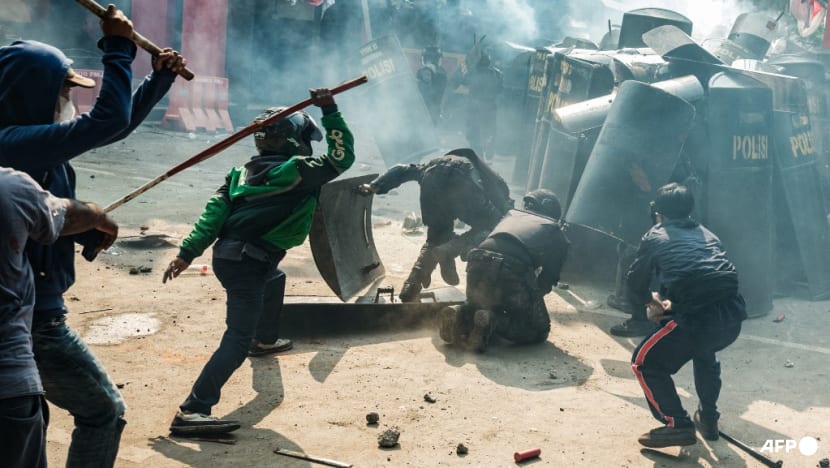
IMPLICATIONS FOR PRABOWO?
Indonesia is no stranger to protests that spill into unrest. During the Asian financial crisis in 1998, thousands of students occupied the national parliament building in a movement that came to be known as Reformasi.
President Suharto, who had ruled for more than three decades, was eventually forced to resign, ending the New Order regime.
But Ray Rangkuti, a political analyst at the Lingkar Madani think tank, said the turmoil seen this week is unlikely to unseat Prabowo’s leadership.
“Judging from the scale of the unrest, it is unlikely (to spread to Prabowo),” said Ray, who was an activist during the 1998 Reformasi movement, in an interview with CNA.
According to Kunto of Padjadjaran University, protesters’ demands are currently focused on lawmakers’ allowance hikes and the police violence that killed Affan.
“For now, there are no direct demands on the government, but this could trigger a domino effect (if left unresolved),” Kunto said.
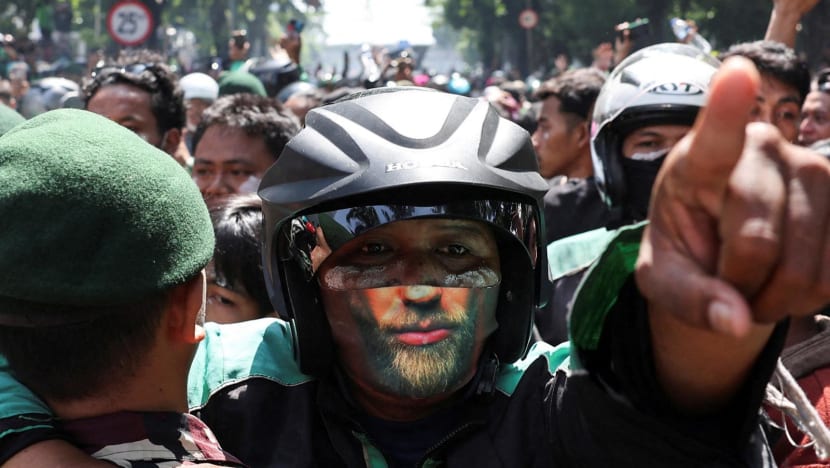
Agung said Prabowo has sought to ease public anger with his statement on Friday. In addition to calling for an investigation into police violence, the president also pledged support for Affan’s family.
“His remarks were fairly empathetic, but I am waiting for the president to ensure a total reform of the police, since he is their supreme commander,” Agung said.
Comprehensive police reform has also been demanded by the Civil Society Coalition, an umbrella group of hundreds of civic organisations in Indonesia.
In their statement on Friday, the group also urged Prabowo to dismiss National Police Chief Listyo Sigit Prabowo, whom they accused of failing to reform the force’s repressive character.
“Police reform must be carried out from the top down and overhauled in a drastic way,” Agung said.
“It’s not just about crowd-control procedures, but also deeper issues such as public services and meritocracy within the police force.”
Ray of Lingkar Madani said Prabowo must also push through broader bureaucratic reforms, starting with removing deputy ministers who simultaneously serve as commissioners in state-owned enterprises.
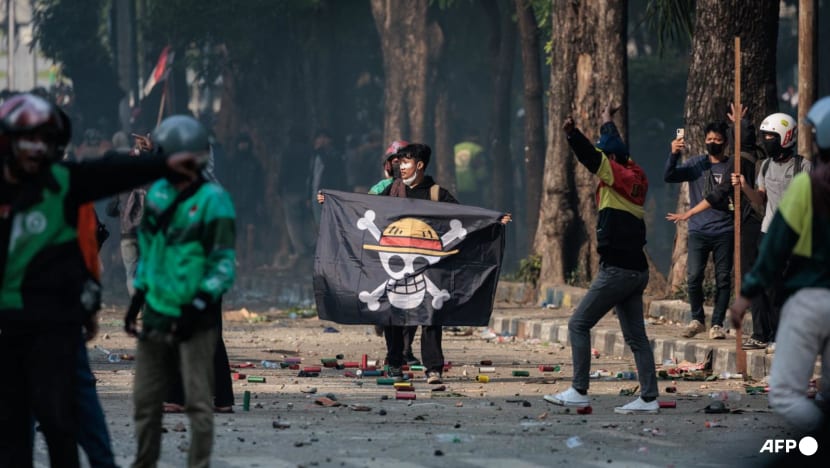
Currently, 30 of 56 deputy ministers hold commissioner posts in various state companies. These roles provide consultation but are not involved directly in operations, and they are viewed with concern as they are considered a burden on the budget.
Indonesia’s Constitutional Court on Thursday ruled to ban deputy ministers from holding concurrent posts, giving the government two years to enforce the decision.
Ray said he hoped Prabowo would move quickly to comply with the court’s ruling.
“This would show the public that the president is truly committed to austerity and not indulging his aides. The people cannot be told to endure hardship while the elites continue to enjoy privileges,” Ray said.















